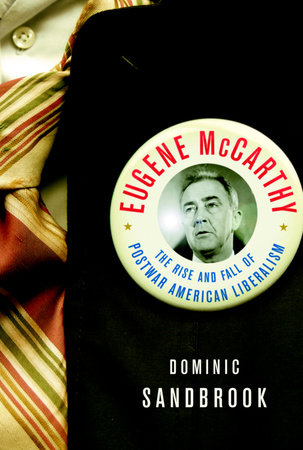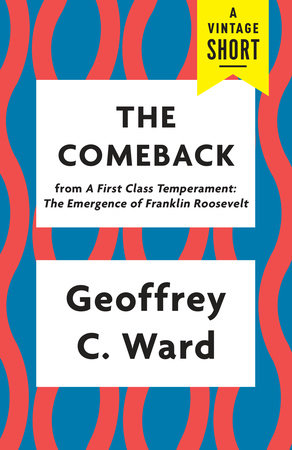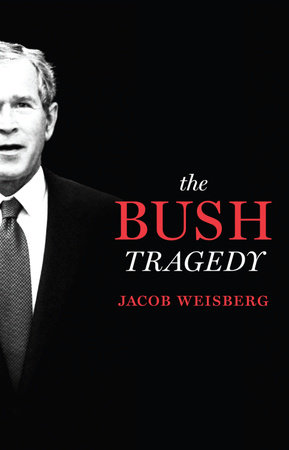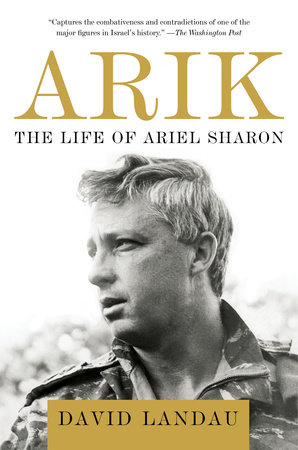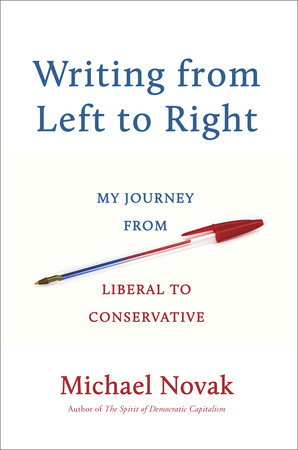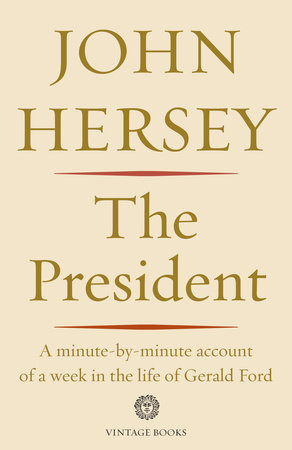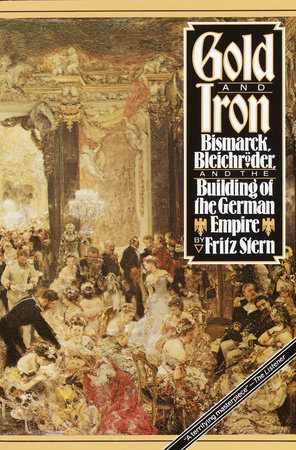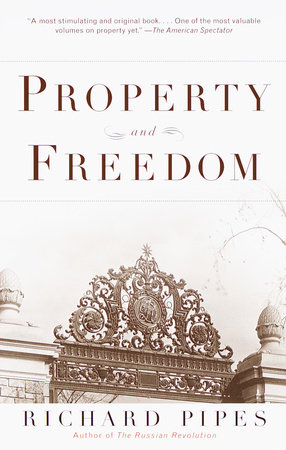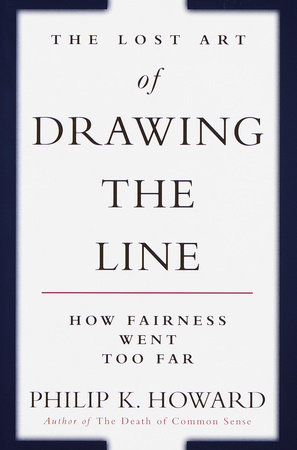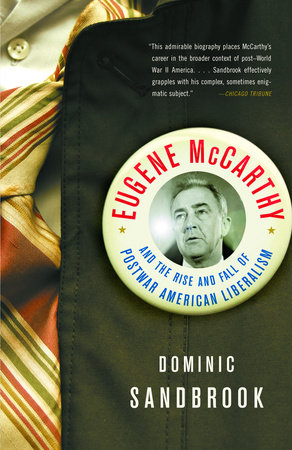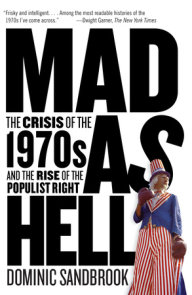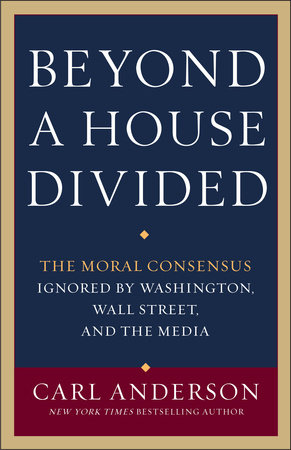Author Q&A
Q: Why did you decide to take Eugene McCarthy on as a subject for your biography?
A: I first read about Eugene McCarthy’s 1968 presidential campaign when I was an undergraduate studying American history at Oxford, and I was immediately fascinated by what appeared to be a particularly dramatic, even romantic story that had this uniquely elusive and enigmatic man as its central character. When I came to choose a subject for my Ph.D. a few years later, McCarthy was the first thing that sprang to mind. Nobody, or at least nobody since the early 1970s, had made any great effort to tell McCarthy’s story, and it struck me that he would make a fantastic subject for a biography. But there was also more to it than that: I wanted to write a book that showed how the Democratic party itself had changed between the 1940s and the 1970s, and I especially wanted to look at the evolution of American liberalism during the postwar period. The beauty of picking McCarthy as a subject was that it allowed me not only to tell his personal story, but also to show how and why the liberal consensus rose and fell between, say, 1948 and 1980.
Q: Briefly tell us why McCarthy had a major impact on the Democratic party in the 1950’s and 1960’s.
A: McCarthy’s career really encapsulates the story of liberal politics in the postwar decades. He came into politics as part of a new liberal Democratic generation in the 1948 election, and he
defined his liberalism in two ways. First, he supported social reform at home, including civil rights and welfare; and second, he was all for the Cold War and vigorous anti-Communism abroad, an example being the Korean War. He was a very successful congressman, popular with the
Democratic party barons and widely regarded as a coming man, and it was no surprise that he moved to the Senate after 1958 and became close to Lyndon Johnson. But then in the 1960s it all seemed to go downhill for McCarthy; he fell out with Kennedy and Johnson, and found himself rather on the fringes. By 1968, however, the Democrats were tearing themselves apart over the conflict in Vietnam, and there was a real rift between the party’s white- and blue-collar elements over the war. McCarthy emerged as the champion of the former: he struck people as the quintessential high-minded moral reformer, leading a principled crusade against the war. The problem for McCarthy, however, – and for the Democratic party right up to the present – is that it proved terribly difficult to bridge that gulf between the middle-class reformers and activists on the one hand, and the great mass of ordinary voters – the silent majority, if you like – on the other. So not only did McCarthy’s 1968 campaign have a major impact on American politics, his career also provides an excellent example of the enduring difficulties of the Democratic party and American liberalism.
Q: Please explain McCarthy’s role in unseating Lyndon Johnson.
A: Well, the two men were friends and close colleagues in the early sixties and McCarthy was actually seen as something of a Johnson protégé. But their relationship soured after 1964, when McCarthy was very hurt and disappointed that Johnson hadn’t picked him as his running mate,
selecting his Minnesota colleague Hubert Humphrey instead. In the years that followed, McCarthy became a very public opponent of the administration’s war in Vietnam, and pretty much severed all his links with the Johnson White House. He was very happy to be invited to run against Johnson in the 1968 Democratic primaries, and at first he thought he was simply raising the Vietnam issue rather than making a serious bid to topple the president. In fact most commentators completely wrote McCarthy off and expected Johnson to thrash him in the first primary, in New Hampshire. But when McCarthy came within a few hundred votes of beating Johnson, thanks particularly to the efforts of his student volunteers, the president was completely humiliated. A few days later, Robert Kennedy declared his own presidential candidacy, and with McCarthy on the brink of a tremendous victory in the Wisconsin primary, Johnson pulled out of the race to save himself further humiliation. It was an amazing outcome that nobody could possibly have predicted a few months earlier, and McCarthy had essentially come from absolutely nowhere to topple the incumbent president – a scenario unprecedented in American political history.
Q: McCarthy was considered a moderate liberal and often contradicted his stance on politics. How do you feel this reflects the collapse of liberalism?
A: McCarthy certainly started out as a liberal and he often used to term to describe himself and his colleagues. What they meant by that, at least in the 1940s and 1950s, was that they were keen not only on social reforms at home but also on aggressive anti-Communism abroad. That formula
allowed people like McCarthy to distinguish themselves from political enemies on their right – the Republicans – and left – the Communists and other radical groups. This liberal consensus worked very well for twenty years or so, and McCarthy was pretty consistent in his beliefs: things like unemployment insurance, welfare spending, civil rights reforms and so on.
But in the late 1960s, the consensus came under attack from all sides, partly because of the Vietnam War, and partly because of the domestic problems of the day like crime, cultural permissiveness and inflation. After implementing the Great Society, the liberals had essentially run out of ideas, and what was more, they were becoming increasingly unpopular as their blue-collar voters were attracted to more conservative politicians. I think all this left the liberals a bit bewildered – some of them moved to the right, others to the left, to try and find a solution. McCarthy was a classic example: he left the Senate at the end of 1970 and made a very definite move towards the radical left, but when he wasn’t picked as the presidential nominee in 1972, he shifted back to the right. By 1976, when he ran as an independent presidential candidate, and 1980, when he endorsed Reagan, he had ended up as, in many respects, a very profound conservative. And by that point the liberal consensus had pretty much collapsed: the commitments that people like McCarthy had made back in the 1940s no longer seemed appropriate for the challenges of the 1980s.
Q: What accomplishments did McCarthy become famous for during his political involvement?
A: He was most famous for his challenge to Johnson in 1968 over the issue of the Vietnam War, but I think it does him a disservice to concentrate just on that. From 1948 onwards he was a very consistent champion of liberal policies at home: he voted for all the major reforms of the Sixties, and he was particularly associated with efforts to help Mexican migrant workers, who had a pretty tough time of it in those days. He was also a keen supporter of the Cold War and that makes his stance on Vietnam especially interesting.
Many of his friends and colleagues, however, felt that he should have achieved much more. McCarthy was without doubt an extremely talented man, but he was often accused of being
arrogant, lazy or waspish, and by the mid-1960s he wasn’t really contributing that much to the Senate. He was evidently very bruised and disappointed by the outcome of the 1968 campaign, and he left the Senate two years later to write and teach before embarking on a series of quixotic independent presidential campaigns. Many of his old colleagues couldn’t understand why he did it; people like Humphrey and McGovern stayed on in the Democratic party, but McCarthy walked away and even endorsed Reagan in 1980. A lot of political observers saw him as an unfathomable enigma; they never understood why, with all his personal gifts, he didn’t leave a more lasting mark on American life.
Q: McCarthy seemed to be very cautious on taking a stance on certain political issues, such as the Vietnam War. How did this affect his career?
A: McCarthy was a careful, moderate man by temperament. He never liked appealing to voters’ emotions and always prized reason and intellect very highly. Indeed he thought compromise was a positive virtue for a politician, so in that respect he looks very cautious, even like a European conservative. On Vietnam that was especially marked because in the Forties and Fifties he had been a strong anti-Communist and supporter of the Cold War, and he was also close to President Johnson, at least at first. So initially he supported the war, and only gradually did he move against it. That said, only a handful of Democratic politicians opposed the war from the beginning, so it wouldn’t be fair to be too harsh to him on that score. In the mid-Sixties, nobody thought of McCarthy as a radical firebrand or crusader. His friends knew that he had doubts about the war, but they saw McCarthy as a very calm, sensible politician who was unlikely to be involved in any great public crusade against it.
Q: Yet, interestingly enough, he was considered a hero. Please explain.
A: By the end of 1966 McCarthy had become a public opponent of the war, speaking out regularly against it in the Senate and on university campuses. That destroyed his relationship with the Johnson White House and with some sections of the Democratic party, but at the same time it meant that he became very popular with students, liberal activists and the peace movement. When he was approached to run for the presidency at the end of 1967, he thought that he had nothing to lose, that he would at least bring the issue to public attention, and that he would have the chance to get his own back in Johnson for having been snubbed of the vice presidency in 1964. What happened then was that McCarthy was taken up by the students and the antiwar movement, many of whom knew little about his career, and elevated into a great hero and crusader for peace. In fact McCarthy himself was very uncomfortable with all the attention; he never wanted to be anybody’s hero, and his relationship with his young supporters was always rather fraught. That’s what makes his reputation particularly interesting and controversial: some people still see him as an out-and-out hero, while others ended up very angry and disillusioned with him.
Q: How long did it take you to complete this biography? Where did you do your research?
A: It took four years for me to do my Ph.D., which is pretty much normal in England, and then two more years to turn it into a book, which basically meant a few tweaks here and there rather than full-scale rewriting. The research was mainly done in American archives. I was fortunate to have a studentship from the British Academy, as well as grants from Cambridge University and the Lyndon Johnson foundation, which meant that I could spend as long as I needed in the US. So I went through McCarthy’s papers in St. Paul, which are fairly enormous, as well as the
collections of the Kennedy and Johnson libraries, the McGovern and Humphrey papers, and various others. I was also lucky enough to interview quite a few of McCarthy’s old friends and colleagues, and McCarthy himself kindly gave me a couple of interviews. Perhaps the most
enjoyable part, though, was going to the Benedictine monastery in Minnesota where McCarthy had been a novice, and interviewing the old monks who had known him back in the 1930s and 1940s. That was a great experience and they were wonderfully warm and friendly.
Q: As a biographer, are there times when you get tired of your subject, or maybe even frustrated, particularly someone as quixotic as McCarthy.
A: They say that every biographer falls out of love with his subject, and it’s true that my opinion of McCarthy did slightly change as I did more research into his life and career. But the knack of writing a successful biography is to achieve the right balance, so that readers can see why people either liked or disliked the subject. At the end of the book, I still found McCarthy a very amusing, engaging and compelling character. He did have his faults, though, and one big
surprise was to discover how many of his old friends and colleagues had very jaundiced views of him. It’s striking, for example, that his old liberal comrades from the 1940s still haven’t
forgiven him for his alleged betrayal of Hubert Humphrey in 1968. But I was never interested in portraying him either as a saint or as an out-and-out sinner. What I’m trying to get across is the complexity of both his personality and his record, and to put that within the wider historical context of the rise and fall of liberalism.
Q: Are you working on a new book?
A: Yes, I’m working on a couple of new projects. One is a two-volume history of Britain in the sixties, which is coming out next year in London. But I suspect American readers will be more interested in the second project, which is being published with Knopf. It’s a book about the 1976 presidential election, the bicentennial and the politics and culture of the mid-Seventies, and it should be coming out in a couple of years.
